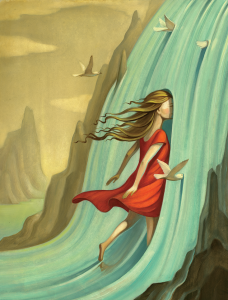Last year I contributed to a book edited by Tim Carson called Neither Here Nor There: The Many Voices of Liminality. The book draws together the expertise, experience, and insights of a coterie of authors, all of whom relate the core concepts of liminality to their unique experiences. Unfortunately, this book is still not available in Australia.
The blog posts that follow are my contribution to this book.
(Please note that this is the Epilogue – follow the links to Part 1, Part 2, Part 3, and Part 4)

It is hard to recognise the kindness and mercy of Providence when your soul seems to convulse with heartache …
Only hindsight provides us with that perspective …
Now I can say that it was mercy that led me to the shadows and the margins.
C.S. Lewis writes, “My idea of God is not a divine idea. It has to be shattered from time to time. God shatters it. God is the great Iconoclast. Could we not almost say that this shattering is one of the marks of God’s presence?” (A Grief Observed). My carefully constructed ideas of God and church lay shattered. I looked at the pieces and knew there was no rebuilding – I had to let go. How hard it is to trust that letting go process. David Foster sums it up beautifully, “Everything I’ve ever let go has claw marks on it.” Faith communities provide an instantaneous essential ingredient of what it means to be human: belonging. To leave is never easy.
Liminality is the ultimate life lesson in trust. It sounds very noble to say that we ‘choose’ to trust. I have found that I trust because I have no other options. No one throws themselves down some random rabbit hole in order to experience trust. Rather, the rabbit hole finds us, often through crisis or suffering, ushered in through our questions, or when our theological ideas no longer match our life experience. Liminality introduces us to trust.
For over two decades I had kept the oceans of mystery and paradox at bay. Suddenly the niggling doubts, the contradictions, the many questions that I used to wave to from a far and safe distance away, loomed like a tidal wave above me.
The ocean was no longer friendly. It had invaded my life and turned my world upside down.
This poem was helpful through that flood-filled time:
Breathing Underwater
I built my house by the sea.
Not on the sands, mind you,
Not on the shifting sand.
And I built it of rock.
A strong house
By a strong sea.
And we got well acquainted, the sea and I.
Good neighbours.
Not that we spoke much.
We met in silences.
Respectful, keeping our distance
But looking at our thoughts across the fence of sand.
Always the fence of sand our barrier,
Always the sand between.
And then one day
(and I still don’t know how it happened)
The sea came.
Without warning.
Without welcome even.
Not sudden and swift, but a shifting across the sand like wine.
Less like the flow of water than the flow of blood.
Slow, but flowing like an open wound.
And I thought of flight, and I thought of drowning, and I thought of death.
But while I thought, the sea crept higher till it reached my door.
And I knew that there was neither flight nor death nor drowning.
That when the sea comes calling you stop being good neighbours,
Well acquainted, friendly from a distance neighbours.
And you give your house for a coral castle
And you learn to breathe under water.
Sr. Carol Bieleck, RSCJ (from an unpublished work)
I felt like I was drifting in an endless ocean with no shore in sight.
It was the observation of a friend that brought me back from the house of sadness. “Nic, I don’t even pretend to understand what this must all feel like, but as your friend, I can tell you that the world and religious structure you were part of is really, really small. I know you think it’s the centre of the universe, but it’s not. Your world is about to get so much bigger.” He was right. Falling into liminality was about letting go of so much. I do not want to downplay the grief associated with the loss I experienced. It felt as if I was saying goodbye to something or someone else nearly every day. But I was also saying hello – to a new world, to new friends, and to a whole new way of being and seeing.
A few years have passed since saying goodbye to so much of life the way I knew it. These days I find myself quite removed from this first half of life with its overtures of religious zealotry. It has been a time of healing, detoxifying, learning to breathe again, and acclimatising to a very different world. There is a sense of standing on a threshold, “betwixt and between,” as Victor Turner once described liminality. According to Turner, it is temporal space – the midpoint between a starting point and an ending point. It holds the idea of temporarily having fallen between the cracks of social structure. However, I would agree with the wisdom of a friend who remarked that our whole life is a liminal space. It is a way of holding ourselves in this world – with an open hand, instead of tightly clutching.
Liminality, presented to me wrapped in pain, exile, and humiliation, was and is a gift. It highlighted to me the bars of my ideological and structural prison of fear, all dressed up in religious morality.
I also experienced a reunion with old friends I had left behind when entering my version of religious absolutism all those years ago. One of them was the joy of not knowing, and the other was the delight of wonder. That most ignored and banished exile of fundamentalism, wonder, has returned to me. Tentative at first, and then, detecting a safe place, she brought her suitcases and moved in …
… Every day she delights me with her songs …
… Every day she teaches me to return her gaze and open my eyes …
Liminality has also changed my taste for music. There is a new rhythm: an unforced rhythm of grace that is now free from being reduced to a necessary tick on my doctrinal boxes of orthodoxy. A rhythm that is tangible, warm, comforting, strong, and relentless.
All is grace!
So, dear Liminal Traveler, I offer you my story in the hope it will bring you a sense of connection to the many others who, like you, may have fallen down the rabbit hole. For me, liminality is the ‘thin space’ of which the Celts have spoken, the rabbit hole where the door between this world and the next is cracked open for a moment, a most uncomfortable place that not everyone will care to hear about or understand.
May you be present in it, for it is indeed a most confusing and liberating gift. Holy.
Don’t surrender your loneliness
So quickly.
Let it cut more deeply.
Let it ferment and season you
As few humans
Or even divine ingredients can.
Something missing in my heart tonight
Has made my eyes so soft,
My voice
So tender,
My need of God
Absolutely
Clear.
Hafiz
